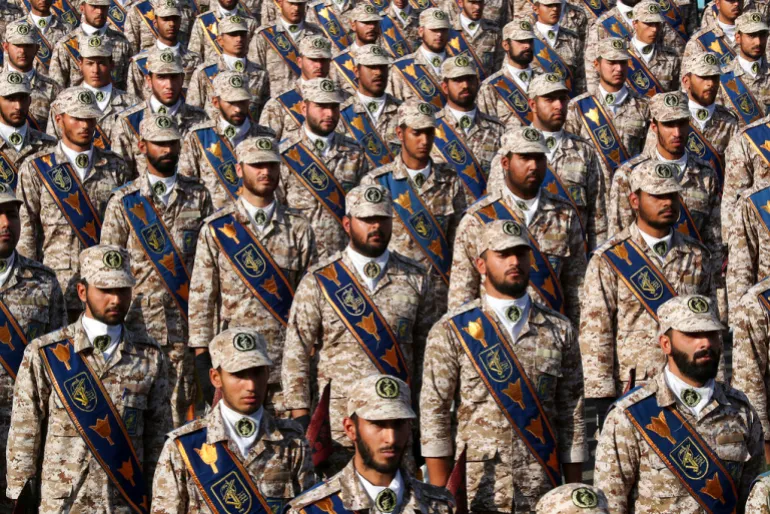US attack on Iran nuclear sites 2025 reaction, consequences, international law, and retaliation
Introduction: World on Edge After US Strikes Iranian Nuclear Facilities
In an unprecedented move, the United States has launched coordinated strikes on Iran’s nuclear facilities at Fordow, Natanz, and Isfahan, triggering international uproar and sharp Iranian condemnation. The Iranian government has labeled the attack “unforgivable” and a “blatant violation of international law,” vowing retaliation under its legitimate right to self-defence.
This article explores the full geopolitical, military, and diplomatic scope of the crisis, including reactions from global powers, possible Iranian retaliation, and the international legal implications of the strikes.
What Happened: Details of the US Strike on Iran’s Nuclear Sites
According to military sources and statements from both nations, the US deployed B-2 Spirit stealth bombers and B-52 aircrafts to strike the underground Fordow facility with GBU-57 bunker busters, while 30 Tomahawk missiles were launched from US submarines to hit Isfahan and Natanz.
Iran has accused the US and Israel of coordinating the operation, with President Trump publicly claiming that the mission was a “success” and warning Iran: “There are many more targets left.”
Iran’s Fierce Response: Revolutionary Guard, Foreign Ministry, and Supreme Leader Condemn US
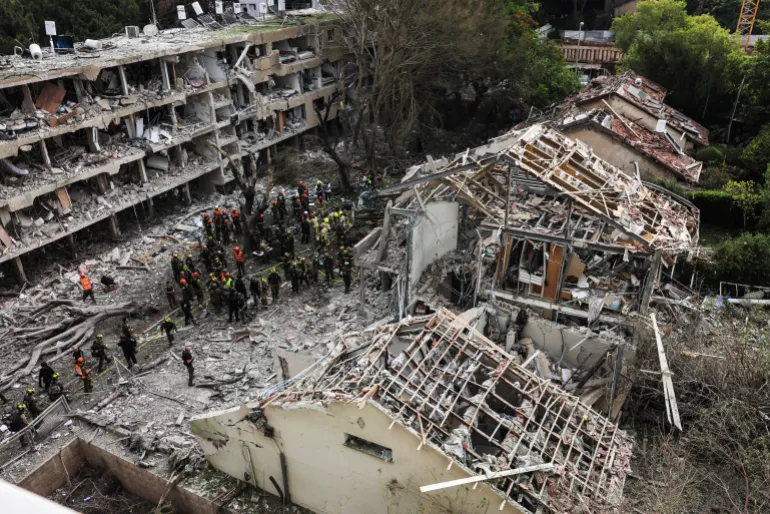
IRGC: “Not Strength but Vulnerability”
The Islamic Revolutionary Guard Corps (IRGC) issued a fiery statement saying that US bases across the Middle East “have become vulnerable targets” and that Iran has “monitored and identified the flight paths” of the American bombers involved in the attacks.
“This was a criminal act of strategic incompetence. Washington will pay a heavy price,” the IRGC warned.
Foreign Minister Araghchi: “Unforgivable Aggression”
Speaking at the Organisation of Islamic Cooperation (OIC) summit in Istanbul, Iranian Foreign Minister Abbas Araghchi condemned the US action as:
“A grave and unprecedented violation of international law and the UN Charter. Iran has done nothing wrong. This aggression is built on falsehoods.”
He further announced emergency consultations with Russian President Vladimir Putin and hinted at military retaliation coupled with diplomatic countermeasures.
International Response: Condemnation, Caution, and Calls for Dialogue
Europe Calls for Restraint
- EU Council President Antonio Costa: Urged immediate de-escalation and return to nuclear negotiations.
- German Chancellor Merz: Called on Iran to return to talks but admitted Iran “never left.”
- Ursula von der Leyen (EC President): Emphasized nuclear safety and reiterated support for a “diplomatic resolution.”
Red Cross Warns of ‘Irreversible Consequences’
ICRC President Mirjana Spoljaric issued a rare warning:
“This is a dangerous collapse of the global rules-based system. War cannot become limitless. Civilians must be spared, and diplomacy must prevail.”
She also confirmed that Red Cross teams are active in both Iran and Israel to prepare for humanitarian fallout.
Legal Implications: Violation of International Law?
Iran and international law scholars argue that the US strikes violated:
- The UN Charter (Article 2.4) prohibiting force against another state.
- The IAEA Safeguards Agreement, as the nuclear sites were under international inspection.
- The Nuclear Non-Proliferation Treaty (NPT), which guarantees peaceful nuclear energy use.
Iran is now calling for UN Security Council action and has accused the International Atomic Energy Agency (IAEA) of inaction.
Is Iran Preparing Military Retaliation?
Iranian officials have hinted at retaliation in line with the “right to self-defence under Article 51 of the UN Charter”. Some possible scenarios include:
| Potential Iranian Retaliation | Details |
|---|---|
| Missile strikes on US bases | 50+ US military facilities in Iraq, Syria, and the Gulf are in range |
| Naval action in Strait of Hormuz | Could disrupt 20% of global oil supply |
| Cyberattacks on US infrastructure | Iran is known to have strong cyber capabilities |
| Proxy attacks via Hezbollah or Houthis | Could trigger regional war |
| Targeting Israeli cities or military sites | Israel has already reported damage in Tel Aviv suburb |
Is There Still a Window for Peace?
Araghchi emphasized that while diplomacy must always remain an option, current circumstances make it “impossible.”
“We were in the middle of talks with the US and Europe when bombs started falling. The US has betrayed diplomacy.”
Iran blames both the Trump administration and Israeli PM Netanyahu for destroying any chance of peace through negotiation.
Russia, Turkey, and Regional Players Step In
Russia
Araghchi is set to meet with President Putin in Moscow for “serious consultations,” indicating that Russia may act as a counterbalance to US aggression.
Turkey
Turkish President Recep Tayyip Erdoğan is reportedly mediating efforts to halt further Israeli strikes. Iran has welcomed Turkey’s role in brokering a ceasefire.
Gulf Nations and the OIC
While the UAE, Qatar, and Oman have condemned the US strike, they are also urging Iran not to escalate. The OIC summit in Istanbul is expected to issue a joint statement supporting Iran’s sovereignty and condemning foreign intervention.
Turkiye’s Position on the US-Iran-Israel Conflict – June 2025
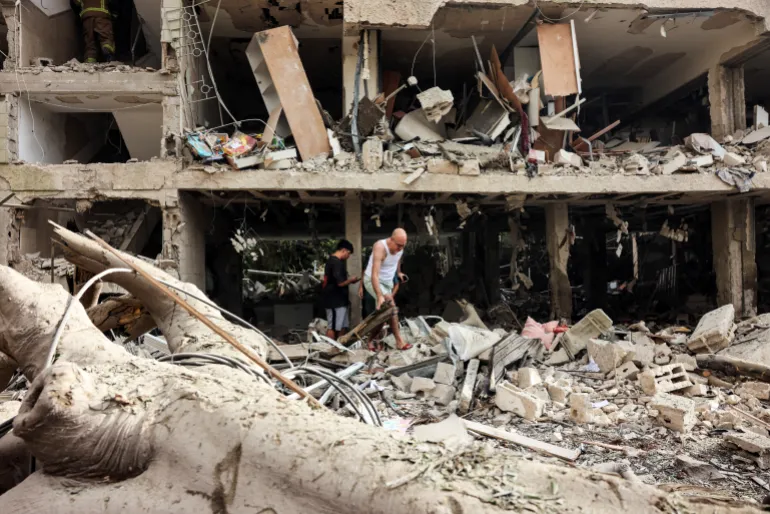
| Aspect | Details |
|---|---|
| Issuing Authority | Ministry of Foreign Affairs, Republic of Turkiye |
| Date of Statement | June 22, 2025 |
| Source | Anadolu Agency (State-run Turkish News Agency) |
| Primary Concern | Escalation of conflict beyond the Middle East |
| Official Quote | “Only negotiations can resolve the nuclear dispute. All parties must act responsibly.” |
| Position on US Strikes | Strong concern over US attack on Iran’s nuclear sites; urges de-escalation |
| Call to Action | Immediate return to dialogue and diplomatic frameworks |
| Position on Israel’s Role | Warned of further escalation if Israeli attacks continue |
| Current Engagement | Monitoring the situation; possibly open to mediation efforts |
| Strategic Importance | Turkiye is a NATO member and shares borders with Iran’s neighboring regions, making its stability-sensitive and diplomatically active in regional security matters |
Airspace Risk Zones for Airlines Post-US Strikes on Iran

| Country | Airspace Risk Level | Reason for Risk | Recommendations by Safe Airspace |
|---|---|---|---|
| Iran | Extreme | Active conflict zone, military strikes ongoing | Avoid all overflight below FL320 |
| Iraq | High | Proximity to US bases, militia activity | Use caution or reroute |
| Bahrain | High | US Fifth Fleet HQ location, potential target | Consider alternate routes |
| Qatar | High | US military base (Al Udeid), possible retaliation point | Monitor NOTAMs closely |
| UAE | Moderate to High | Regional hub, strategic air corridor | Maintain situational awareness |
| Saudi Arabia | Moderate | Bordering conflict zone, past Houthi drone activity | Heightened alert for operators |
| Kuwait | Moderate | Near Iranian airspace, possible spillover | Limit operations during tensions |
| Oman | Moderate | Near Strait of Hormuz, air corridor | Monitor for airspace alerts |
Note: No direct threats to civilian aircraft yet, but tension raises risk of miscalculation or collateral impact.
Kheibar Shekan (Khorramshahr-4) Missile – Specifications
| Feature | Details |
|---|---|
| Missile Name | Kheibar Shekan / Khorramshahr-4 |
| Developer | Iran’s Islamic Revolutionary Guard Corps (IRGC) |
| Unveiled | February 2022 |
| Type | Medium-Range Ballistic Missile (MRBM) |
| Estimated Range | ~1,450 km (900 miles) |
| Payload Capacity | ~1,500 kg (heaviest in Iran’s arsenal) |
| Propulsion | Liquid-fueled |
| Guidance System | Likely Inertial + Satellite (not publicly confirmed) |
| Launch Platform | Mobile Transporter-Erector-Launcher (TEL) |
| Strategic Purpose | Designed to bypass missile defense systems and deliver heavy warheads at long range |
| Named After | City of Khorramshahr, symbolic in Iran-Iraq War |
US Strikes on Iranian Nuclear Facilities – Main Facts
| Targeted Site | Location | Attack Method | Damage Level | Purpose of Facility |
|---|---|---|---|---|
| Fordow | Near Qom | 6 GBU-57 Bunker Busters by B-52 | Moderate (underground site) | Uranium enrichment |
| Natanz | Central Iran | 30 Tomahawk Missiles | Heavy | Main uranium centrifuge hub |
| Isfahan | Central Iran | Airstrikes and cruise missiles | High | Conversion and fuel processing |
Iran’s Declared and Potential Retaliation Paths
| Response Type | Description | Strategic Goal | Likelihood |
|---|---|---|---|
| Missile strikes on US bases | Attack US military facilities in Iraq, Syria, Bahrain | Retaliate without escalating into full war | High |
| Targeting Israeli cities | Use medium-range missiles to hit Tel Aviv or Haifa | Direct deterrence against further Israeli action | Medium |
| Cyber attacks | Sabotage US energy/infrastructure networks | Asymmetric warfare option | High |
| Closing Strait of Hormuz | Naval blockade | Impact global oil markets & gain leverage | Medium |
| Proxy operations via Hezbollah/Houthis | Attacks via non-state allies | Plausible deniability & multi-front pressure | Very High |
Global Reactions and Diplomatic Positions
| Country/Organization | Reaction Summary | Position |
|---|---|---|
| European Union | Called for de-escalation, diplomacy | Neutral, pro-dialogue |
| Russia | Hosting emergency talks with Iran | Pro-Iran, strategic partner |
| Turkey | Mediating potential ceasefire | Regional mediator |
| United States | Claims strikes were successful, warns Iran | Aggressive, justifying self-defence |
| Israel | Claims victory, prepares for Iranian retaliation | Aggressive, offensive posture |
| ICRC (Red Cross) | Warns of humanitarian disaster | Humanitarian, anti-escalation |
Legal Implications Under International Law
| Legal Instrument | Violation Claimed | Explanation |
|---|---|---|
| UN Charter Article 2.4 | Yes | Prohibits use of force against another UN member |
| NPT (Non-Proliferation Treaty) | Yes | Attacking peaceful nuclear programs breaches treaty |
| IAEA Safeguards Agreement | Yes | Sites under monitoring—strike could damage oversight |
| Customary International Law | Yes | Proportionality and sovereignty not respected |
| Article 51 UN Charter (Self-defense) | Claimed by Iran | Justifies retaliation after external aggression |
Timeline of Recent Events in US-Iran-Israel Crisis
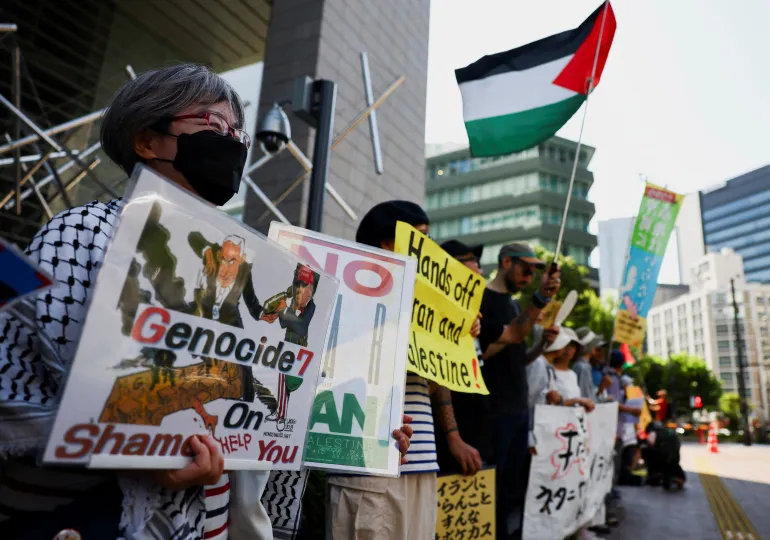
| Date | Event | Details |
|---|---|---|
| June 20, 2025 | Trump announces strikes on Fordow, Natanz, Isfahan | Bunker busters and Tomahawk missiles used |
| June 21, 2025 | Iran condemns strikes as “unforgivable” | Statement at OIC summit |
| June 22, 2025 | Israel strikes Dezful, Isfahan military airports | Reports of damage to Iranian airbases |
| June 22, 2025 | Iran launches missile retaliation on Tel Aviv | 27 injured in Ramat Aviv suburb |
| June 23, 2025 | Araghchi visits Turkey, prepares visit to Russia | Strategic consultations initiated |
Strategic Implications of the US-Iran Conflict
| Area | Implication | Description |
|---|---|---|
| Middle East Stability | Threatened | Multi-front conflict risks dragging in regional powers |
| Global Oil Prices | Likely Spike | Hormuz disruption and uncertainty may trigger market panic |
| US Foreign Policy | Questioned | Accusations of illegal aggression and unilateralism |
| Non-Proliferation Regime | Undermined | Attacking IAEA-monitored sites sets dangerous precedent |
| Humanitarian Impact | Severe Risk | Escalation will strain regional relief efforts and displace civilians |
Expert Analysis: What’s Next for the Middle East?
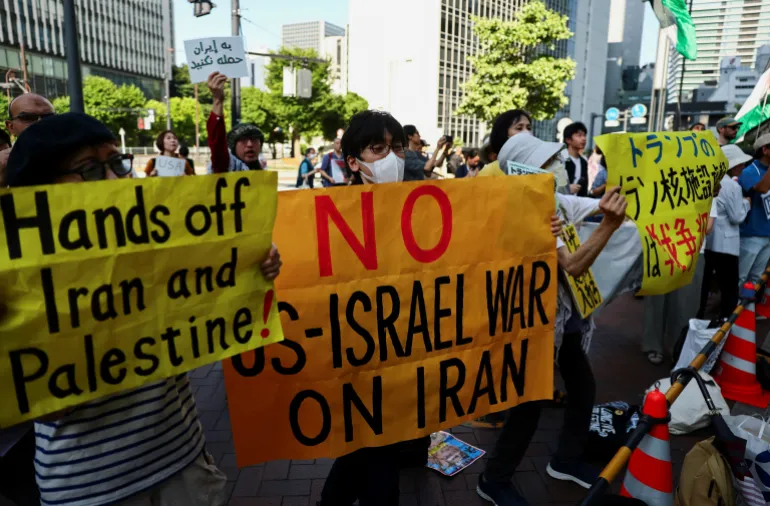
| Analyst | Opinion |
|---|---|
| Alon Pinkas (Former Israeli Diplomat) | “Israel will now watch for US policy shift towards regime change in Iran.” |
| Stephen Zunes (US Professor) | “This is about regional dominance, not nuclear threats.” |
| Foad Izadi (Tehran University) | “This is part of a plan to Balkanise Iran, divide it into pieces.” |
| Trita Parsi (Quincy Institute) | “The real danger is a sustained bombing campaign disguised as ‘surgical strikes’.” |
Final Thoughts: Are We on the Brink of War?
With both Iran and the US digging in, and Israel continuing to strike Iranian-linked assets, the world may be on the verge of the largest Middle East war in decades. The collapse of nuclear diplomacy and disregard for international law signal a new era of confrontation.
Iran’s next move—whether measured or massive—will likely determine whether this spirals into a wider regional war, possibly drawing in Russia, Turkey, and Gulf countries.
FAQs: US-Iran-Israel Crisis 2025
Is Iran going to retaliate?
Yes, Iranian officials have confirmed retaliation under international law is “inevitable.”
Was the US attack legal?
Many international law experts say the US violated both the UN Charter and the NPT.
Will Russia intervene militarily?
Not directly for now. But Russia is coordinating diplomatically with Iran.
What happens to the nuclear deal (JCPOA)?
Iran says the deal is “dead” and no longer trusts the US or Europe.
Could oil prices spike?
Yes. Any disruption in the Strait of Hormuz could lead to a global energy crisis.

